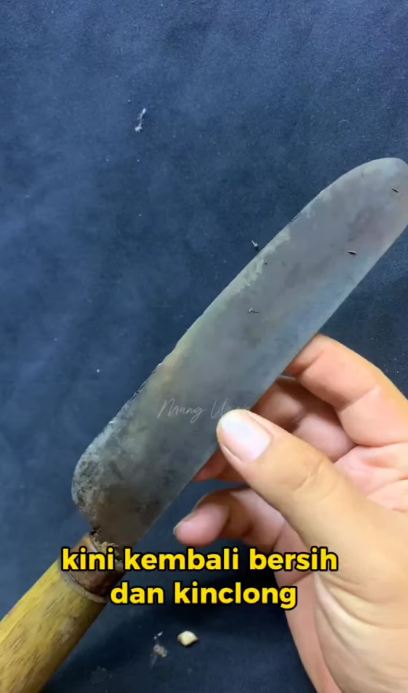Instagram/@jesep.ardin
Brilio.net - Rust on knives is often a serious problem in the kitchen. Not without reason, the rust on the knives makes the appearance of this piece of furniture look dull. Apart from that, rust also makes the knife difficult to use or even dull, thereby reducing its effectiveness in cutting.
To deal with rusty knives, there are several methods that can be used. One method that is often used is to rub the knife with sandpaper. Apart from helping remove rust, sandpaper can also make the knife sharp again, you know.
But instead of rubbing it with sandpaper, there are other methods that can be used to solve the problem. An Instagram user @jesep.ardin once shared this further via one of the uploaded videos. He admitted that he only used kitchen ingredients to remove rust from the knife .
Reported by BrilioFood on Thursday (25/4), the kitchen ingredient in question is lime. Yup! Lime is considered to help remove rust and make knives sharp again. Even chronic rust can be removed with this kitchen ingredient .
However, to make it easier to clean with lime, there are a number of steps that must be done first. The first thing to do is burn the knife over the stove fire. Burn until the knife is really hot evenly, OK?

photo: Instagram/@jesep.ardin
Next, prepare a glass and fill it with hot water until it is full. Only then put the knife that has been burned into a glass filled with hot water. Leave it for a few moments until the knife and water in the glass are cold. This will make the rust on the knife start to soften and be easy to clean later.

photo: Instagram/@jesep.ardin
When it's cold, take the knife, then rub the rusty surface with a lime wedge. Because it is soft, the rust on the knife will easily come off when rubbed. Do this process until the knife is completely clean. Only then rinse the knife with running water.
Please note that lime contains citric acid which is acidic and can help dissolve rust on metal. When lime is applied to a rusty surface, its citric acid will react with the rust and help it dissolve. Apart from that, lime also has antibacterial and antifungal properties, so it can help clean metal surfaces from germs and fungi that might grow on the rust.

photo: Instagram/@jesep.ardin
Well, the knife that has been cleaned looks shinier, you know. Because the rust is gone, the knife becomes sharper. That way, of course the knife will be more comfortable when used to cut various kinds of food ingredients.
How? Easy enough, right? If the knife at home is rusty, you can apply this trick straight away. We guarantee that even though the rust is thick, you can still make the knife sharp again like new.
View this post on Instagram
Tips for keeping kitchen knives sharp.
To keep kitchen knives sharp and effective when used, here are nine tips you can do:
Use the knife on a suitable surface, such as paper scissors or a knife on a cutting board, not on a hard surface such as a plate or glass.
When cutting, use precise and steady movements, avoiding excessive pressure which can damage the blade.
Sharpen the knife regularly using a sharpening stone or appropriate sharpening tool to keep the blade sharp.
Store the knife in a safe place and do not come into contact with other hard surfaces or metal that could damage the blade.
Avoid washing the knife in the dishwasher, as this can damage the blade and handle.
After washing, dry the knife well before storing to prevent rust.
Use a soft cutting board, such as wood or plastic, to protect the blade from damage.
Avoid using a knife to cut materials that are too hard or materials that could damage the blade.
Check the blade regularly for signs of damage or wear that need repair.
(brl/psa)